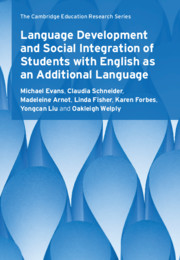Book contents
- Language Development and Social Integration of Students with English as an Additional Language
- Language Development and Social Integration of Students with English as an Additional Language
- Copyright page
- Contents
- Figures
- Tables
- Acknowledgements
- 1 Introduction
- 2 Education and Social Integration for EAL Students
- 3 The International, National and Regional Policy Context of Social Integration in Schools
- 4 The Methodology of Researching EAL
- 5 Progression in Language, Learning and Social Integration
- 6 Towards an Inclusive Pedagogy for EAL in the Multilingual Classroom
- 7 Rethinking Home–School Communication for Parents of Migrant Children
- 8 Conclusion
- References
- Index
4 - The Methodology of Researching EAL
Published online by Cambridge University Press: 03 July 2020
- Language Development and Social Integration of Students with English as an Additional Language
- Language Development and Social Integration of Students with English as an Additional Language
- Copyright page
- Contents
- Figures
- Tables
- Acknowledgements
- 1 Introduction
- 2 Education and Social Integration for EAL Students
- 3 The International, National and Regional Policy Context of Social Integration in Schools
- 4 The Methodology of Researching EAL
- 5 Progression in Language, Learning and Social Integration
- 6 Towards an Inclusive Pedagogy for EAL in the Multilingual Classroom
- 7 Rethinking Home–School Communication for Parents of Migrant Children
- 8 Conclusion
- References
- Index
Summary
This chapter discusses salient methodological considerations and challenges in undertaking empirical research with young, newly arrived migrant students. This includes questions relating to negotiating access, sampling of core participants, the role of language and use of interpreters, and the importance of giving migrant students a voice as part of an overall holistic approach which focuses on the student perspective and the relationship of this to school and parental perspectives. Approaches to assessing language development and social integration are explored. Such considerations raise questions about the relevance of conducting research with newcomer migrant students in a range of different countries and contexts. This chapter also provides an overview of the research design adopted in the studies funded by the Bell Foundation and explores how such methodological considerations were taken into account throughout the study.
Keywords
- Type
- Chapter
- Information
- Language Development and Social Integration of Students with English as an Additional Language , pp. 73 - 94Publisher: Cambridge University PressPrint publication year: 2020

